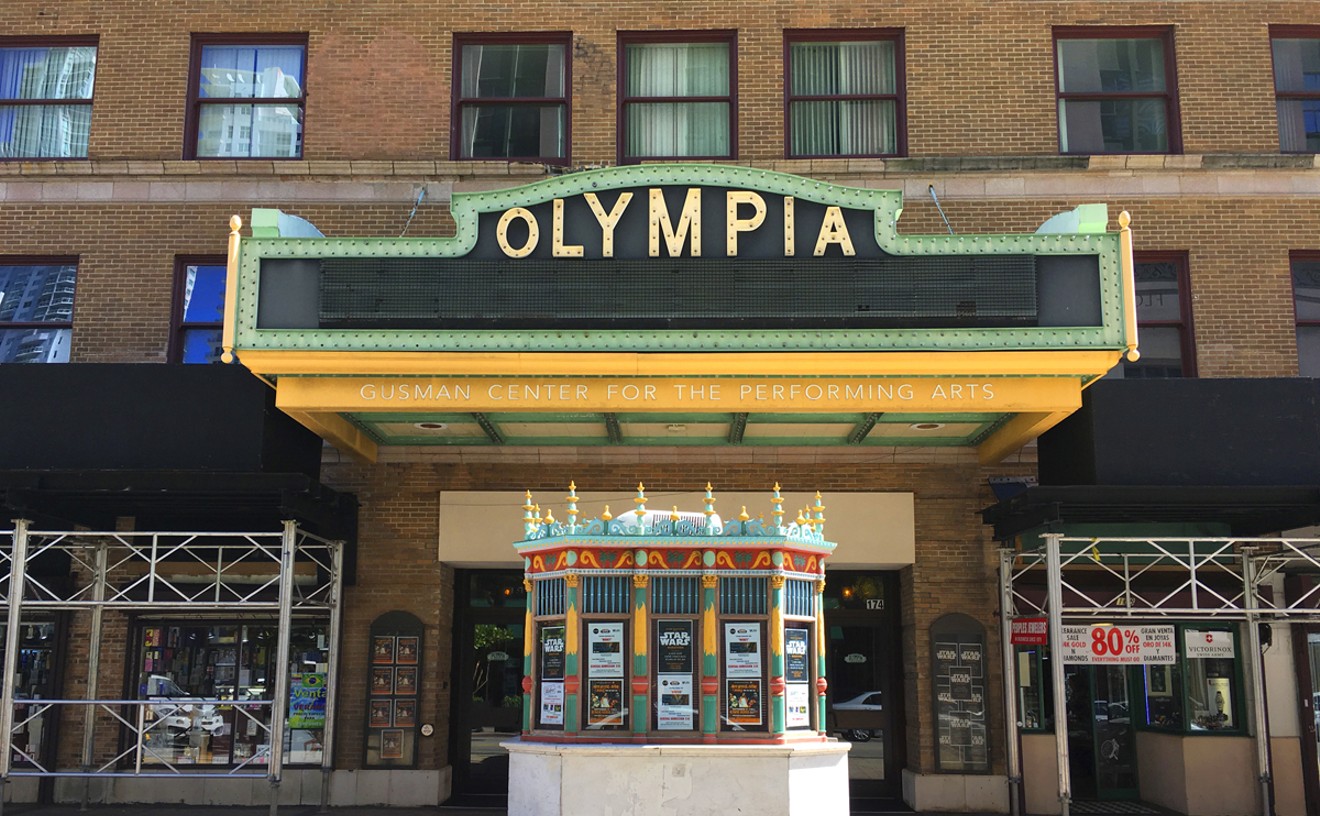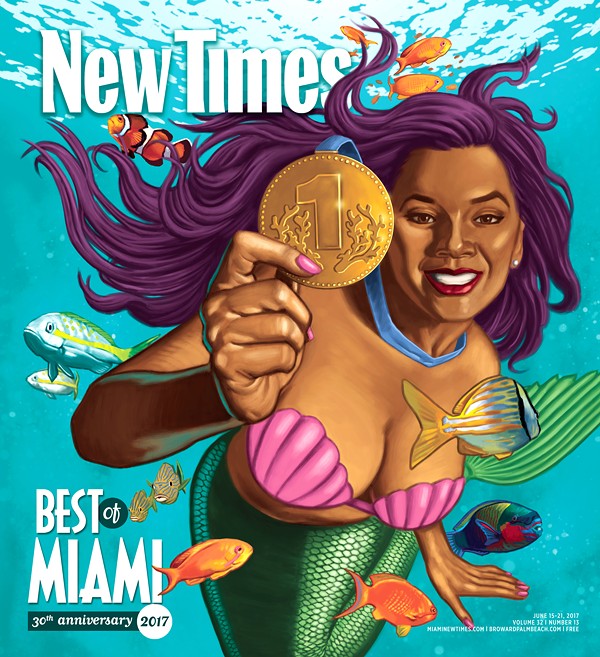Tired of scrolling through a seemingly endless stream of bros in manks (that's male tank tops, obviously) on Tinder? Done with the kind of dudes who text you only past 10 p.m.? Head to the Olympia Theater the second Tuesday of the month for the Moth's Miami StorySlam, where for $10 you can listen to true stories told live and sip cocktails for a few extra bucks. With open-mike topics touching on everything from love to loss, it's safe to bet the audience is packed with emotionally intelligent men — you know, the type who read books and tune into NPR. Catch eyes with one of them under the softly lit chandeliers of the historic, Mediterranean-inspired theater, and you just might have the perfect story to someday tell your smarty-pants kids.
Best Place to Meet Intelligent Men
Moth Miami StorySlam
Best Place to Meet Intelligent Women
Femme Agenda meetings at Miami Workers Center
When you hear Lutze Segu speak about the Femme Agenda's coalition, you might feel like a high-speed train just rushed by about three inches from your face. That's because the passion and expertise of Segu, who is the Miami Workers Center's gender justice organizer, are palpable — and are exactly what make this intersectional-feminist, grassroots committee the radical, inclusive, and sorely needed space South Florida needs. The Femme Agenda advocates for reproductive justice and adequate sex education in Miami-Dade, a domestic workers' bill of rights, and affordable housing and living wages for the women most affected by poverty and discrimination. Femme Saturdays is a space open to anyone in South Florida interested in learning more about social justice and allyship and has included everyone from seasoned black, indigenous, and trans activists to Pinecrest soccer moms foraying into sociopolitical activism. Looking to impress these brilliant femmes who gather in the Workers Center's MiMo District office? Take a few minutes to brush up on your bell hooks and Angela Davis before popping in. After all, if it's fiercely intelligent beauties you're after, you sure as hell should be willing to fight for their equality and access to opportunity.
- 745 NW 54th St., Miami, 33127 Map
- 305-759-8717
- miamiworkerscenter.org
Best Place for a First Date
Cinema Series at SoundScape Park
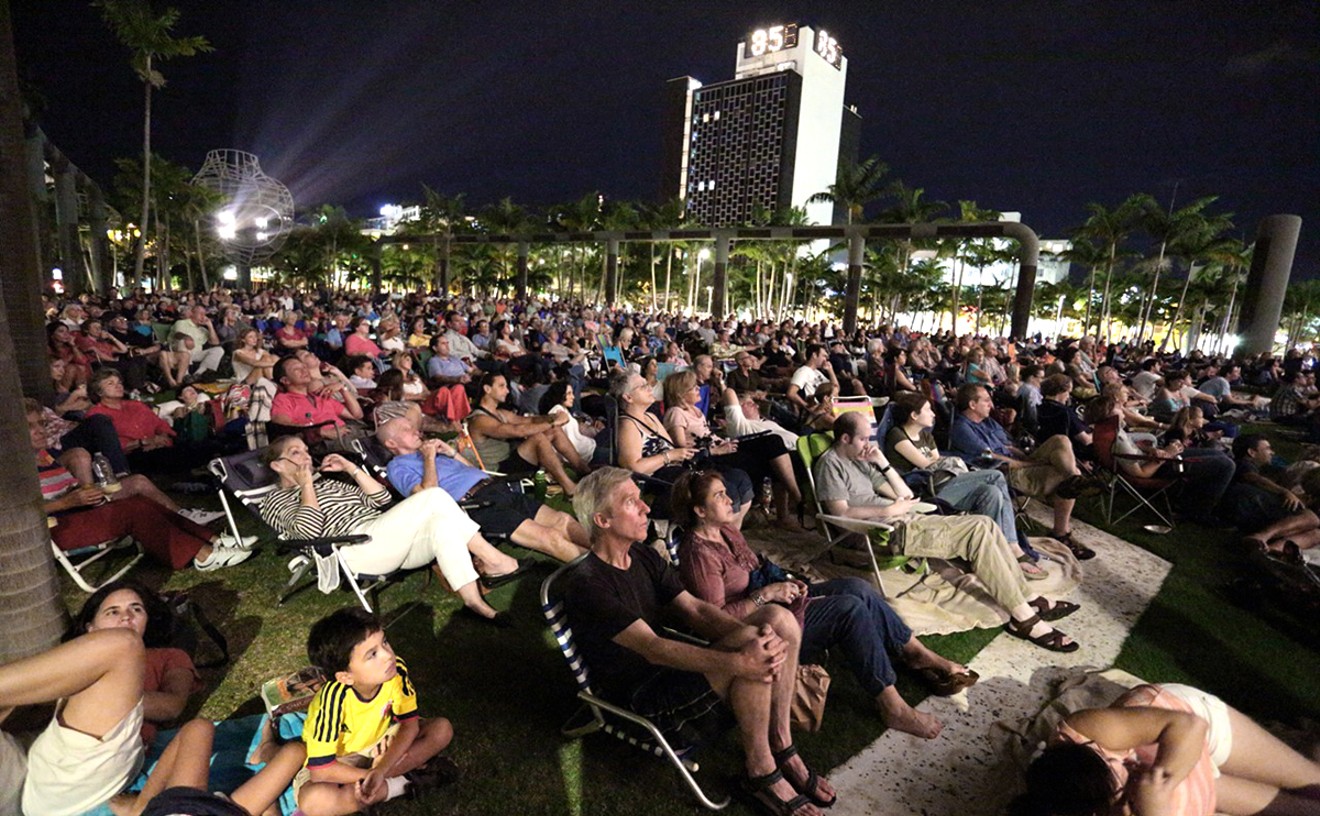
Stop fussing about whether to take your Tinder matches out for Chinese or Italian, because any sane Miamian will admit they couldn't care less about General Tso's chicken and more about a date that limits awkward silences. Cinema Series at SoundScape Park has you covered. At 8 p.m. every Wednesday between October and May, a movie — anything from Finding Dory to The Great Gatsby and Napoleon Dynamite — is projected free of charge in glorious HD on the huge, 7,000-square-foot white wall of the Frank Gehry-designed New World Center. There's plenty of space in the 2.5-acre park to spread out on a blanket and cozy up, or post up with lawn chairs next to the wall. One hundred sixty-seven individually tuned speakers installed throughout the park augment the sound and drone out those uncomfortable breaks in conversation between you and your new paramour. The park's location — conveniently located next to the Miami Beach Convention Center parking lot — allows for a stroll and a bite to eat before or after the flick.
- 400 17th St., Miami Beach, 33139 Map
Best Escape From Reality
Schnebly Redland's Winery & Brewery

The very same things that make Miami fascinating and glorious also make it exhausting. It's a vibrant hub of international visitors, but those same visitors make traffic cutthroat, pack the always-bumping clubs, and choke up Wynwood's streets while snapping endless selfies. Locals need an escape. Look no further than Schnebly Redland's Winery & Brewery, a patch of paradise about 35 miles southwest of downtown Miami. The winery and brewery sit on 30 lush acres in the Redland — about as far as you can get from luxury high-rises and crammed streets. Schnebly even has waterfalls. The wine is made from local fruits such as lychee, guava, and avocado. Not your thing? You can guzzle beers brewed with mango and coconut at Miami Brewing Co., located right on the grounds. Winetasting costs $12.95 per person. (Friday nights, there's a $10 cover for live entertainment; Saturday nights, it's $12.50.) There's even a farm-to-table restaurant, the Redlander, adjacent to the winetasting area, and out back in the taproom, a grill serves bar bites such as chicken wings, ribs, and tacos. Spend an afternoon here to "uncork, unplug, unwind," as the company's tag line goes, and you just might be ready to take on life in the Magic City again.
- 30205 SW 217th Ave., Homestead, 33030 Map
- 305-242-1224
- schneblywinery.com
Best Place to Take Out-of-Towners
Versailles
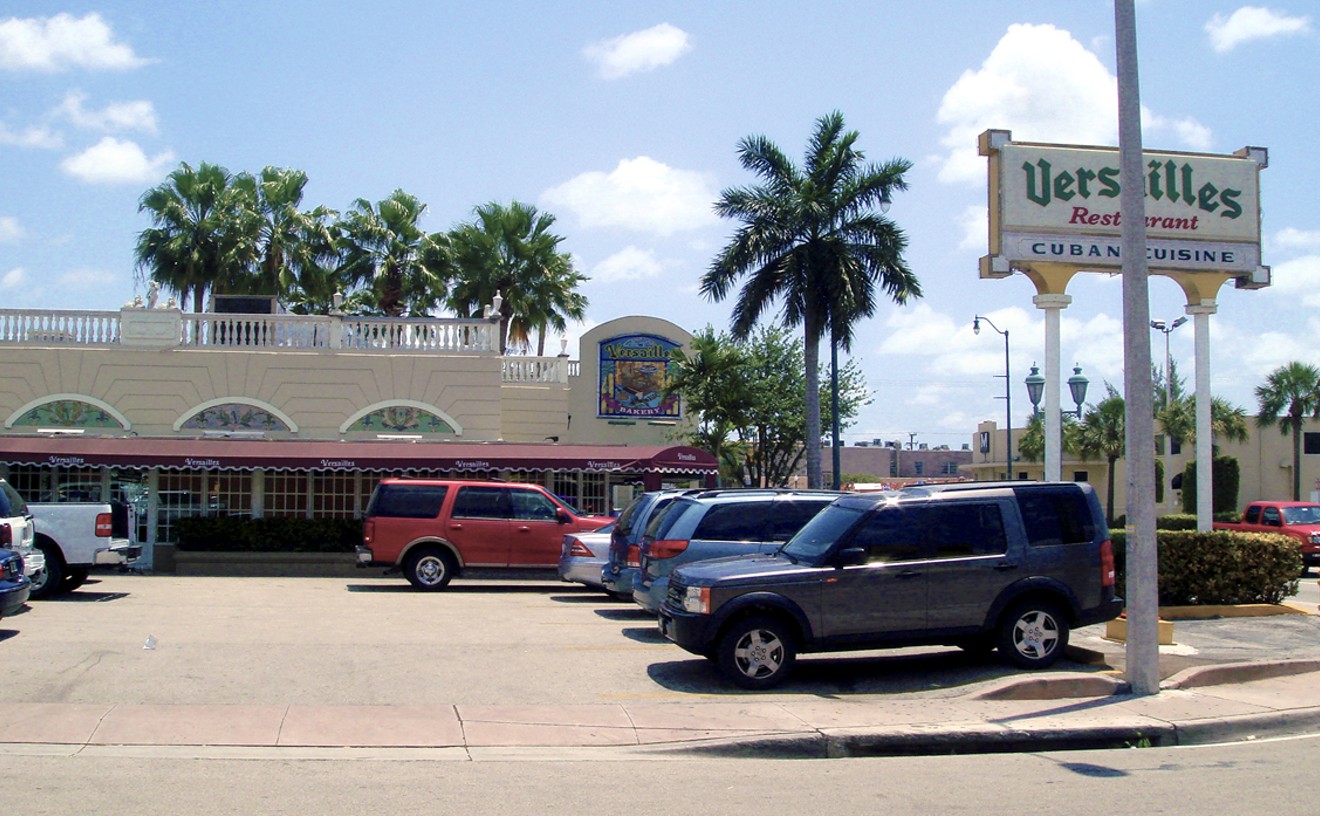
When Fidel Castro died last year, only one spot in town drew dozens of sweat-drenched reporters, flag-waving exilios, and politicians clad in guayaberas: Versailles, the still-beating heart of Miami's Cuban diaspora. Presidential candidates can't win in this town without first sipping a cafecito at the restaurant's ventanita. The building remains a relic from Miami's 1980s heyday, when Cuban dissidents hung out inside and plotted ways to overthrow the Castro dictatorship. Nowadays, the eatery remains a family-friendly outpost for locals and tourists alike, where you can still down a plate of ropa vieja next to a city commissioner or just a few viejos talking trash about Che. When your out-of-town guests want a taste of the loco energy that makes the Magic City tick, a quick stop at Versailles is the only ticket you need.
- 3555 SW Eighth St., Miami, 33135 Map
- 305-444-0240
- www.versaillesrestaurant.com
Best Festival
Borscht Film Festival

The Best Picture mixup at this year's Oscars might be the craziest thing to ever go down on the Academy Awards stage. But it didn't even rank among the weirdest things that happened in Miami's film scene this year, thanks to the Borscht Film Festival. For the tenth edition of its irregularly scheduled fest, the Borscht collective — a group of young filmmakers devoted to celebrating and sharing Miami's essential strangeness, and also responsible for introducing Moonlight's creators to each other — planned five days of hilarious and heartbreaking events and film screenings. They staged the festival's death, holding a funeral service at a Little Havana mortuary. They brought Animal Collective to the New World Center, a venue that normally hosts classical symphonies, to play trippy tunes accompanying videos of coral having sex. They rode Jet Skis across Biscayne Bay to a screening of the Kevin Costner anti-classic Waterworld. And if Borscht's events were inspired, the films the collective produced were inspiring. At the main screening, viewers saw a documentary about a dude who got internet-famous by filming videos of himself feeding deer in his backyard; a gritty neon drama about a violent Manila gang; and the short, animated tale of a Miami manicurist. One film showed artist Antonia Wright's naked body crashing through a glass pane in slow motion, over and over, more reverent, violent, and meaningful with each repetition. By the time the calendar hit Borscht's final day, which coincided with the Oscars, Moonlight's unorthodox win felt not only justified but also perfectly on trend.
Best Chutzpah
Miami-Dade County School Board
Warranted or not, there's sure a lot of talk about Soviet-era Communism filtering through the Zeitgeist. (Spasibo, Comrade Trump!) But Miami's jaw dropped in February when news broke that essentially boiled down to "state-run body tries to take control of public news-radio station." And, yes, that story took place right here in Miami-Dade County, not in Bishkek, Kyrgyzstan. Thanks to some wacky funding rules, the Miami-Dade County School Board technically owns the license to 91.3 WLRN, South Florida's essential National Public Radio affiliate. Apropos of nothing, the school board randomly decided it ought to have the power to hire and fire WLRN reporters and wanted to immediately force the station's 19 journalists to "reapply" for their jobs. Head-scratchingly, the board tried to claim the move was all about "safety," because WLRN reporters aren't subject to the same background-check requirements as other school board employees such as teachers or principals. This, of course, ignored the fact that the station had offered to match its rules to those of the school board, and shone a light on the real reason behind the move: A bald-faced power grab so obscene that the school board quickly had to retreat in the face of national outrage. Good call, because this isn't Soviet Russia, and a state body should never try to take over a news organization.
Best Public Restroom
The Design District
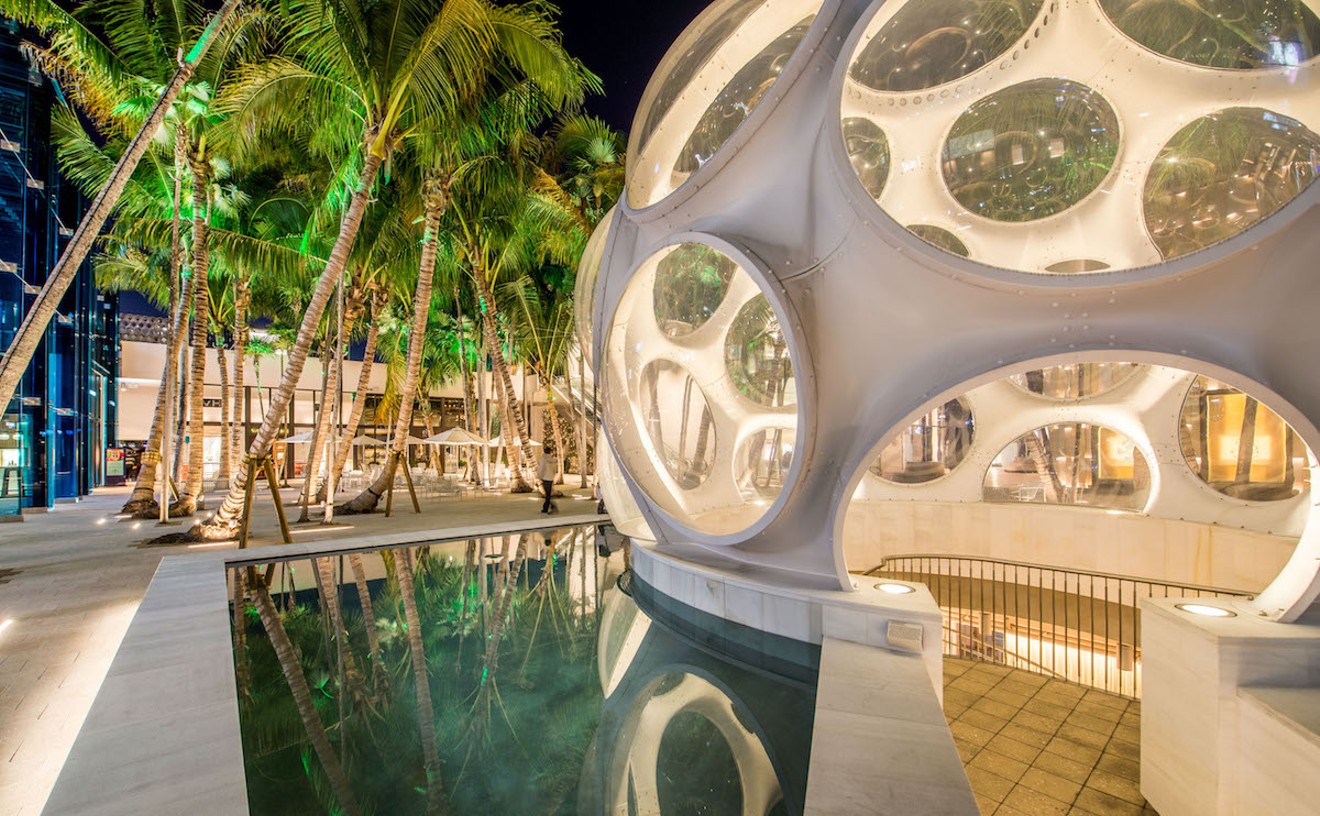
Rich or poor, beautiful or ugly, everyone has at least two things in common: We all, occasionally, need to go number one or number two. This can be a problem if, say, you find yourself in the middle of a shopping spree at Tom Ford on a muggy summer afternoon with only minutes until blastoff. If you so much as fart on one of those suits, they'll charge you a month's rent. Luckily, just up the escalator and to the right in Palm Court of Miami's luxe Design District lies the city's most glorious public bathrooms. Oh, they're something — spotless and sleek, with all the amenities you could hope for. The stalls offer privacy from floor to ceiling, eliminating that awkward eye-contact gap most mall bathrooms subject you to. Sweet soap and multiple drying options make cleanup a breeze.
- 140 NE 39th St., Miami, 33137 Map
- 305-722-7100
- miamidesigndistrict.net
Best Citizen
Dave Doebler
The best thing about living in Miami is the endless supply of things to do on the weekends. You can lounge on a pristine beach, dive amid neon-hued coral, blast through the Everglades in an airboat, and dance until sunrise at myriad world-class nightclubs. Dave Doebler took one look at the list of those selfish but glorious free-time options and thought, Actually, I would like to spend my Saturdays collecting trash. Doebler runs Volunteer Cleanup, a group that organizes trash pickup operations across Miami Beach. Doebler also chairs the city's Sustainability and Resiliency Committee and has worked to ban polystyrene products from polluting Biscayne Bay. Doebler knows South Florida is an environmental jewel — and unlike the thousands of visitors who vomit garbage on the beach every weekend, he sticks around to take care of it.
Best Power Couple
Ximena Caminos and Alan Faena
In a few short years, the stretch of Miami Beach from 32nd to 36th Street has gone from a rundown tourist trap to a glittering, world-class destination for the top 1 percent of the 1 percent. This is due to the vision of Alan Faena working with an incredible group of collaborators, including his longtime work partner, Ximena Caminos. The Argentine Faena is all id: He wears white exclusively, walks around in hats as large as oil rigs, and spends his free time building gigantic hotels and art houses with his name slapped on the side. He's like the most tasteful sibling Donald Trump never had. (Goldman Sachs CEO Lloyd Blankfein and art-world king Larry Gagosian have already bought property at the Faena House condos, so Faena's Rolodex isn't far off from the Donald's.) And Caminos, the executive director of the nonprofit Faena Art, is in charge of bringing the culture of the district to life by supporting artists through the commissioning of new and time-based exhibitions — from popular to experimental — that are open to the community. In November, Caminos told Vogue she's trying to use the District's spaces, such as the newly built Faena Forum on Indian Creek Drive, to create a "fantastic artists' movement, a new romanticism" in town. We'll take that over a faceless condo complex any day.


